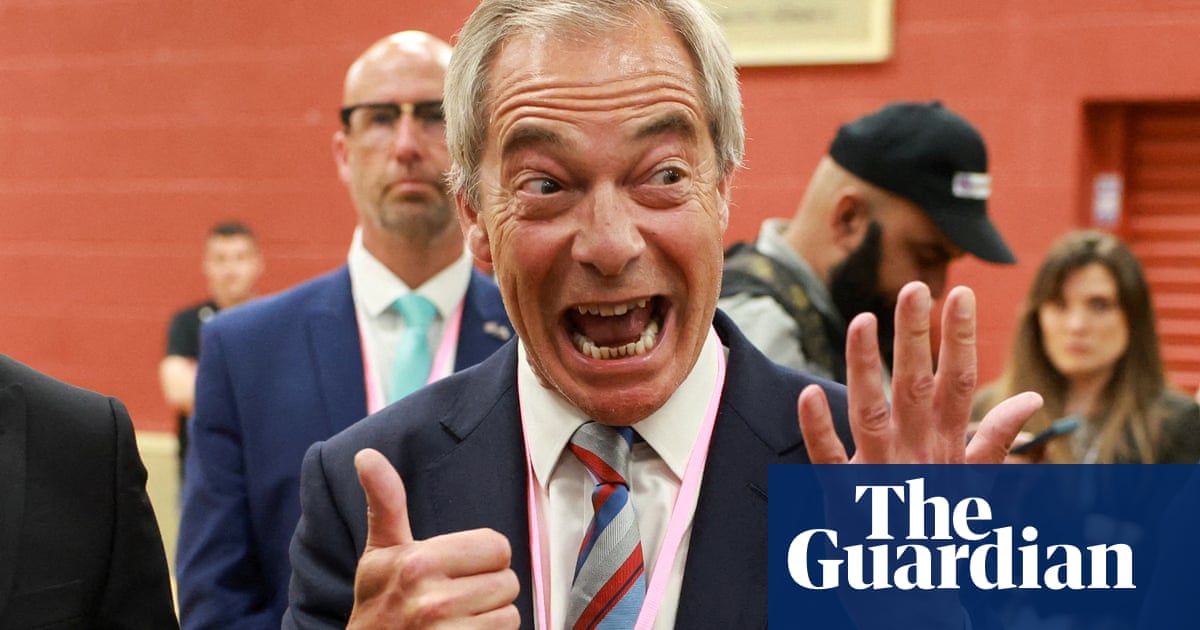Nigel Farage has claimed Reform UK has overtaken the Conservatives as the main party of opposition after hisparty narrowly won a byelection,a mayoralty and more than a dozen council seatsin early results on Friday.
The Reform leader said the results from Runcorn and Helsby, Greater Lincolnshire and a handful of local elections around the country showed his party should now be taken seriously as a prospective party of government.
Speaking to reporters in Runcorn, where the party won with a majority of just six votes, Farage said: “We’ve dug very deep into the Labour vote and, in other parts of England, we’ve dug deep into the Conservative vote. After tonight, there’s no question, in most of the country we are now the main opposition party to this government.”
Reform won in Runcorn and Helsby with a 17-point swing away from Labour, overturning a majority of more than 14,000. The Conservatives slumped from 16% of the vote at last year’s general election to 7% in this contest, narrowly finishing ahead of the Green party in third place.
Meanwhile, Andrea Jenkyns, the former Conservative MP, won the newly created Greater Lincolnshire mayoralty with a majority of 44,000 votes.
In a victory speech punctuated by angry attacks on her opponents, Jenkyns said: “I take my hat off to our leader, Farage. I know one day he will make a great prime minister.”
By 8am on Friday, Reform had won 23 council seats, while Labour had lost 10 and the Conservatives seven. Labour did manage to hang on in three closely watched mayoral contests, however, winning in Doncaster, North Tyneside and the West of England.
The results bolster findings from national polls, which put Reform ahead of both Labour and the Conservatives.
John Curtice, the polling expert and professor of politics at Strathclyde University, told the BBC: “We’ve never previously had a situation where, even at an interim stage, we’ve got a party other than Conservative or Labour not just with more votes, but with more [council] seats than anybody else.”
In Runcorn, which was contested after the sitting Labour MP Mike Amesburywas convictedof punching a constituent, Farage’s party sought to make immigration the key issue, raising fears over small boat crossings, houses of multiple occupancy and even Turkish barbers.
The party also attacked Labour’s cutting of the winter fuel payment – an issue raised repeatedly by voters – as well as its early release of prisoners and the rising cost of energy bills.
In Doncaster, the re-elected Labour mayor, Ros Jones, also highlighted cuts to the winter fuel allowance as fuelling voters’ anger, as well as reductions in disability payments and a rise in national insurance.
Asked whether Keir Starmer was listening to her voters, Jones said: “I would say no. They haven’t actually realised, because the people of Doncaster know how hard life can be, and it’s about delivering for them.”
Sign up toFirst Edition
Our morning email breaks down the key stories of the day, telling you what’s happening and why it matters
after newsletter promotion
One Labour MP said: “It’s all very well for No 10 to say we’ve got to keep delivering. The problem is that it’s the stuff we’ve delivered that people hate.”
The Conservatives are also under pressure after what appears to have been a disappointing night. In Greater Lincolnshire, the party came a distant second. And in the West of England mayoral contest, the Tories came fourth, behind the Reform candidate, Arron Banks, whotold the Timesduring the campaign he thought the mayoralty was a “meaningless job”.
Nigel Huddleston, the co-chair of the Conservatives, told the BBC: “This is always going to be difficult for us. We lost two-thirds of our MPs at last year’s general election. We do have the humility to recognise that we are in the recovery phase.”
The Liberal Democrats said they were hoping for big gains as local election results continued to come in. They targeted the Conservatives in affluent parts of southern England such as Devon, Shropshire and Oxfordshire.
The Greens were disappointed to lose out in the West of England mayoralty race, which polls suggested they would win, but were hoping for gains in other parts of the country later in the day.
“This is the first time when the two parties have been challenged from more than one direction at the same time,” said Curtice.
